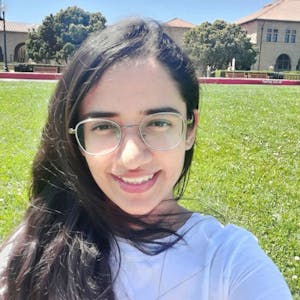When it comes to career, Charlie has one trick: to focus. But that doesn’t mean that you shouldn’t try different things — currently a senior front-end developer at Netlify, she is also a sought-after speaker, mentor, and a machine learning trailblazer of the JavaScript universe. "Experiment with things, but build expertise in a specific area," she advises.
What led you to software engineering?My background is in digital marketing, so I started my career as a project manager in advertising agencies. After a couple of years of doing that, I realized that I wasn't learning and growing as much as I wanted to. I was interested in learning more about building websites, so I quit my job and signed up for an intensive coding boot camp called General Assembly. I absolutely loved it and started my career in tech from there.
What is the most impactful thing you ever did to boost your career?I think it might be public speaking. Going on stage to share knowledge about things I learned while building my side projects gave me the opportunity to meet a lot of people in the industry, learn a ton from watching other people's talks and, for lack of better words, build a personal brand.
What would be your three tips for engineers to level up their career?Practice your communication skills. I can't stress enough how important it is to be able to explain things in a way anyone can understand, but also communicate in a way that's inclusive and creates an environment where team members feel safe and welcome to contribute ideas, ask questions, and give feedback. In addition, build some expertise in a specific area. I'm a huge fan of learning and experimenting with lots of technologies but as you grow in your career, there comes a time where you need to pick an area to focus on to build more profound knowledge. This could be in a specific language like JavaScript or Python or in a practice like accessibility or web performance. It doesn't mean you shouldn't keep in touch with anything else that's going on in the industry, but it means that you focus on an area you want to have more expertise in. If you could be the "go-to" person for something, what would you want it to be?
And lastly, be intentional about how you spend your time and effort. Saying yes to everything isn't always helpful if it doesn't serve your goals. No matter the job, there are always projects and tasks that will help you reach your goals and some that won't. If you can, try to focus on the tasks that will grow the skills you want to grow or help you get the next job you'd like to have.
What are you working on right now?Recently I've taken a pretty big break from side projects, but the next one I'd like to work on is a prototype of a tool that would allow hands-free coding using gaze detection.
Do you have some rituals that keep you focused and goal-oriented?Usually, when I come up with a side project idea I'm really excited about, that excitement is enough to keep me motivated. That's why I tend to avoid spending time on things I'm not genuinely interested in. Otherwise, breaking down projects into smaller chunks allows me to fit them better in my schedule. I make sure to take enough breaks, so I maintain a certain level of energy and motivation to finish what I have in mind.
You wrote a book called Practical Machine Learning in JavaScript. What got you so excited about the connection between JavaScript and ML?The release of TensorFlow.js opened up the world of ML to frontend devs, and this is what really got me excited. I had machine learning on my list of things I wanted to learn for a few years, but I didn't start looking into it before because I knew I'd have to learn another language as well, like Python, for example. As soon as I realized it was now available in JS, that removed a big barrier and made it a lot more approachable. Considering that you can use JavaScript to build lots of different applications, including augmented reality, virtual reality, and IoT, and combine them with machine learning as well as some fun web APIs felt super exciting to me.
Where do you see the fields going together in the future, near or far? I'd love to see more AI-powered web applications in the future, especially as machine learning models get smaller and more performant. However, it seems like the adoption of ML in JS is still rather low. Considering the amount of content we post online, there could be great opportunities to build tools that assist you in writing blog posts or that can automatically edit podcasts and videos. There are lots of tasks we do that feel cumbersome that could be made a bit easier with the help of machine learning.
You are a frequent conference speaker. You have your own blog and even a newsletter. What made you start with content creation?I realized that I love learning new things because I love teaching. I think that if I kept what I know to myself, it would be pretty boring. If I'm excited about something, I want to share the knowledge I gained, and I'd like other people to feel the same excitement I feel. That's definitely what motivated me to start creating content.
How has content affected your career?I don't track any metrics on my blog or likes and follows on Twitter, so I don't know what created different opportunities. Creating content to share something you built improves the chances of people stumbling upon it and learning more about you and what you like to do, but this is not something that's guaranteed. I think over time, I accumulated enough projects, blog posts, and conference talks that some conferences now invite me, so I don't always apply anymore. I sometimes get invited on podcasts and asked if I want to create video content and things like that. Having a backlog of content helps people better understand who you are and quickly decide if you're the right person for an opportunity.What pieces of your work are you most proud of?It is probably that I've managed to develop a mindset where I set myself hard challenges on my side project, and I'm not scared to fail and push the boundaries of what I think is possible. I don't prefer a particular project, it's more around the creative thinking I've developed over the years that I believe has become a big strength of mine.***Follow Charlie on Twitter





































